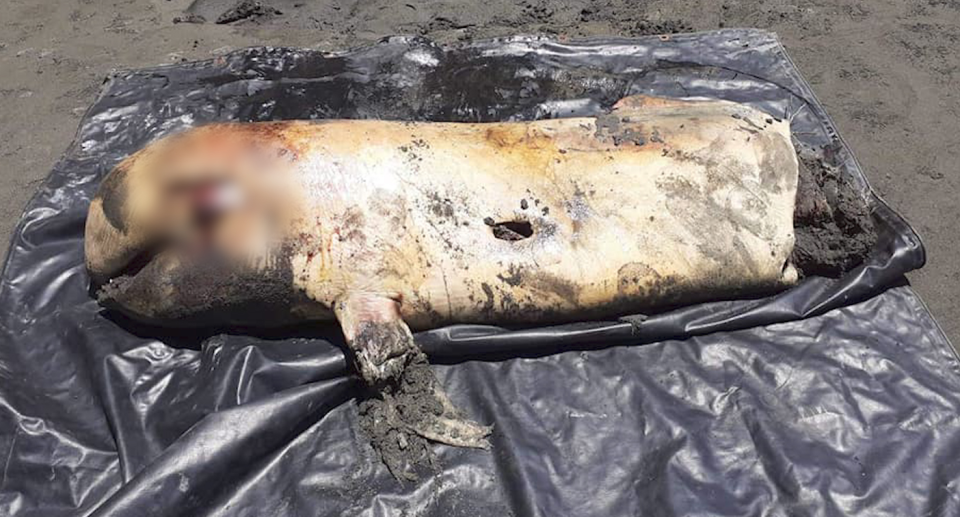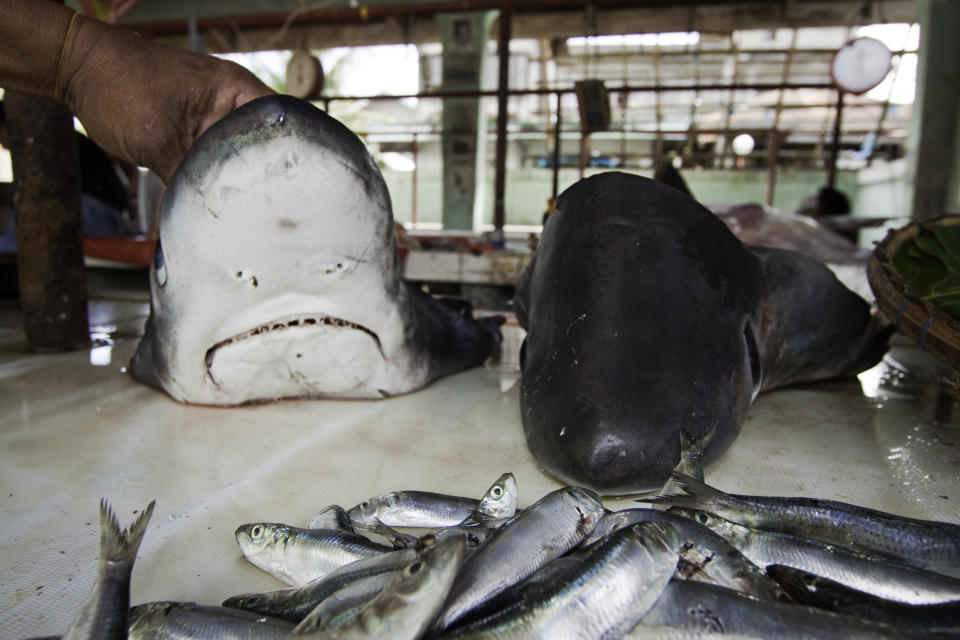The sinister motive behind gruesome find on tropical beach
WARNING - GRAPHIC CONTENT After reports that a dismembered whale had mysteriously washed up on a muddy beach, a marine mammal expert drove 159km across the Philippines to determine who was responsible.
D’ Bone Collector Museum owner Darrell Blatchley has investigated the deaths of countless dead marine mammals, but he singles out this one as being particularly “nasty”.
What his team found last Saturday at Times Beach in Davao, 960km south of Manila, wasn’t a whale, but a Risso’s dolphin that had been cut in half and its organs removed.
Mr Blatchley has dedicated his life to exposing human practices that lead to dolphin and whale deaths.
Although weary from the drive, he got to work on the autopsy.


“There was no heart, no organs because of how big a cut it was,” he told Yahoo News Australia.
“Basically in terms of the internal organs, everything had been eaten by sea creatures or gutted out.
The creature’s overpowering smell continues to haunt Mr Blatchley.
“I had gloves on but my hands still stink.”
“I’ve tried everything to get the smell off, vinegar and powdered chlorine
‘Good sized knife’: Sinister motive revealed
As well as forensically working to determine cause of death, Mr Blatchley cleans carcasses down to the bone in order to educate the public at his museum through online videos.
Many of the animals he opens up are found with their stomachs full of plastic bags and other household items.
This animal hadn’t been killed by human carelessness though - Mr Blatchley believes it was something more sinister.
Next he ruled out a boat propellor as being the culprit.
Dolphins killed in this way are “mangled”, but this one had a clean slice all the way down to the stomach.
“If it was someone hacking away with it you’d see multiple cut lines,” he said.
“This was done with a good sized knife.”


Mr Blatchley believes a fisherman had sliced it open to hide the evidence of their accidental dolphin kill.
“If a larger boat pulls in a dolphin and it’s dead or alive, what they’ll do is cut the stomach to make the internal organs go out and then just drop it back in the ocean,” he said.
“That way they figure it will sink, and a shark will come eat it, and it won’t float back up to one of the beaches.
“Their hope is that it will eliminate any evidence that they’ve been catching dolphins in their nets.”
Being a fatty animal, Mr Blatchley believes the dolphin didn’t sink and with a steep decline in shark numbers in the region, it wasn’t eaten.
Horrific story behind dolphin activist's collection of rocks
Court ruling prevents the catch and kill of sharks on the Great Barrier Reef
Food supply under threat
Dr Leonardo Guida from Australian Marine Conservation Society told Yahoo News Australia that a sharp global decline in apex predators like sharks could result in the collapse of fish populations.
Sharks keep a number of other commercially important fish populations healthy by keeping other species in check.
“Sharks are a keystone species in the environment and incredibly important to food webs,” he said.


“Thirty-percent of known shark and ray species across the world are facing the threat of extinction.
“The primary cause of this is over fishing.
“It is incredibly important that nations work together to ensure that populations are sustainable and there are fish in the future.”
Do you have a story tip? Email: newsroomau@yahoonews.com.
You can also follow us on Facebook and Twitter, download the Yahoo News app from the App Store or Google Play and stay up to date with the latest news with Yahoo’s daily newsletter. Sign up here.



